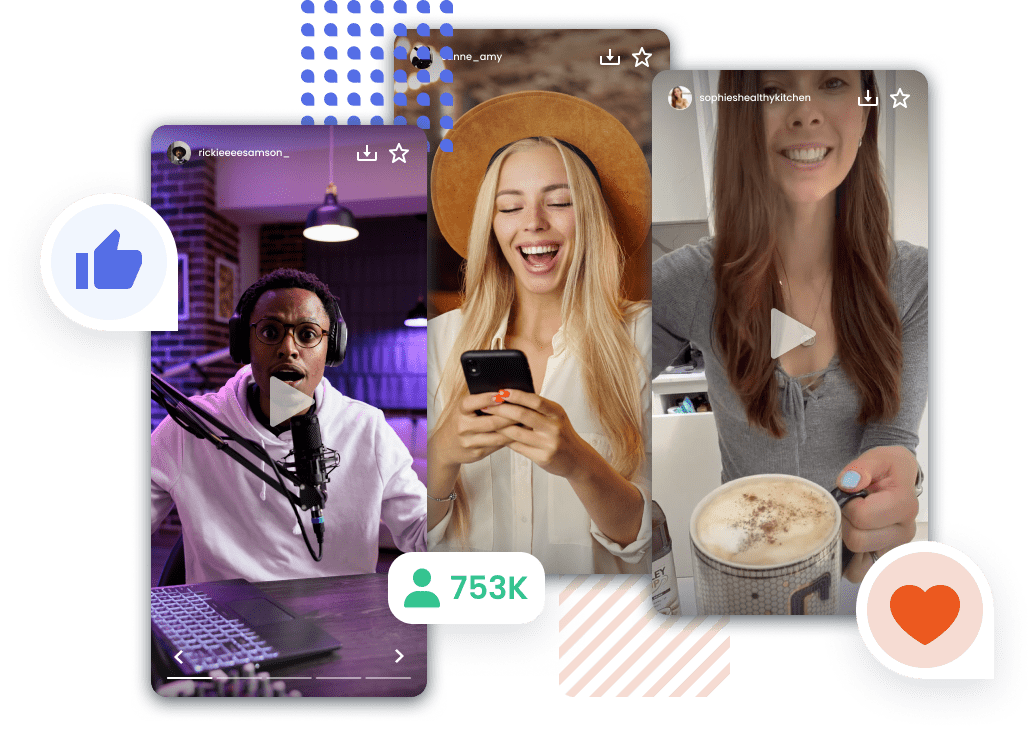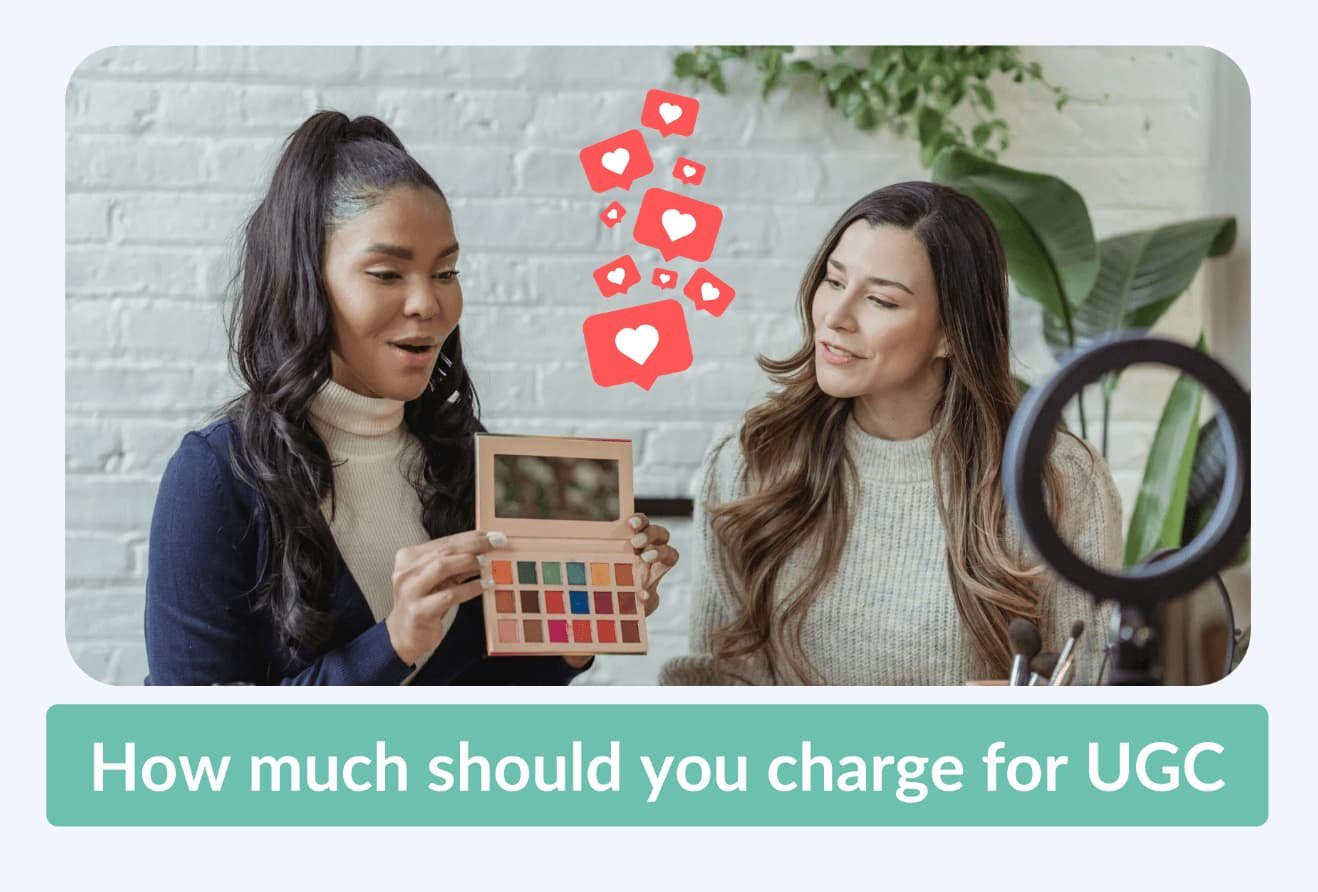


UGC Rates - How much should an Influencer charge for UGC
User-generated content (UGC) has become a vital asset for brands, driving 28% higher engagement than standard brand posts. As a creator, knowing how much to charge for your UGC is crucial for ensuring fair compensation and professional growth. With the UGC market expanding rapidly, it’s essential to understand the factors that influence pricing. This guide will help you navigate the complexities of UGC rates, empowering you to make informed decisions about your creative work.

What is UGC
User-generated content (UGC) refers to any content created and shared by consumers or fans of a brand rather than the brand itself. This includes photos, videos, reviews, and social media posts. UGC is highly valued for its authenticity and ability to engage audiences, making it a powerful tool in modern marketing strategies.
Learn how to become a UGC creator in our detailed article.
Why do brands use UGC
1. Authenticity and Trust
UGC offers an authentic perspective that traditional advertising often lacks. According to a 2021 survey by Stackla, 79% of people say user-generated content highly impacts their purchasing decisions because it feels more genuine and trustworthy than brand-created content.
2. Higher Engagement Rates
Content generated by users tends to drive higher engagement. A study by Adweek found that UGC posts on social media see a 28% higher engagement rate than standard brand posts, highlighting the power of peer recommendations.
3. Cost-Effective Marketing
UGC can significantly reduce marketing costs. Instead of investing in expensive photo shoots or video productions, brands can leverage content created by influencers or customers. This not only saves money but also involves the community in the brand's story.
4. Enhanced Brand Loyalty
Encouraging and sharing UGC can build a strong sense of community and loyalty. When customers see their content featured by a brand, it creates a deeper emotional connection. According to a report by Tintup, 60% of consumers say they feel more loyal to brands that feature their content.
5. SEO and Online Visibility
UGC can improve a brand's SEO performance. Fresh, relevant content created by users can boost search engine rankings. A BrightLocal study found that businesses with positive UGC see a 12% increase in web traffic, enhancing their online presence.
How to charge / set your pricing for UGC
Price based on media type
One way you can structure your pricing is based on media type. You can set different pricing for a picture, video’s as well as the format. Creators frequently charge a bit more for video content. It is important to distinguish the content form as well. UGC for Instagram or TikTok are often lower priced compared to UGC for Youtube. The reason is that creating a video for Youtube takes more time and requires additional equipment.
Ready to land brand deals on social media? Discover how by reading our in-depth guides on how to get brand deals on TikTok and how to get brand deals on Instagram!
Price based on time
A lot of creators calculate how much time it would cost approx. to create the content. If you set an hourly rate for your work you are able to calculate how much you ideally want to charge for creating content. Using an Hours calculator can help streamline this process by providing a quick and accurate estimate. For example if you set your hourly rate at $50 / hour and you estimate it will cost around 3 hours to create the piece of content you could charge $150 for a picture or video.
Price based on quality of work & experience
This is probably the most important. Quality of the content can deviate a lot. If you compare yourself to your peers and other creators in your niche how would you rate yourself? Try to be honest here if you have the feeling that the quality of the content is above average you are able to charge higher rates. Having a good portfolio often helps. Remember it is not just about using the best equipment to create high quality content. Research how to best speak to the camera to create engaging content and learn what works best in marketing. If you are able to explain all of this and show your expertise to the brand chances are that they are willing to pay more.
Create bundles
Creating content bundles is an effective strategy for influencers to offer more value and attract clients. By packaging multiple pieces of UGC, such as a set of photos, videos, and social media posts, you can provide a comprehensive content solution. This approach allows you to offer better rates per piece, making your services more attractive to brands. Bundles also streamline the content creation process, making it easier to manage and deliver high-quality results consistently.
For example if you usually charge $150 for an UGC video you could bundle it together and offer a small discount. For 3 UGC video’s for example the usual rate would be $450 and you could offer a bundled price of $400 instead.
Price based on audience size
Although the quality of your content is more important than your audience size it can still impact your rate. The reality is creators with larger, highly engaged audiences can often charge more. The reason for this is that brands are often willing to pay a premium for content with someone who is known by their target audience.
Example of UGC Rates
This chart provides a detailed breakdown of the average rates for various types of UGC. The rates vary based on the complexity and scope of the content, ranging from single story frames to more comprehensive bundles of static posts and videos.
Additionally, it outlines the costs associated with specific rights and exclusivities, which are crucial for brands looking to maximize the impact and control of their content.
UGC Rates VS. Influencer Rates
When considering content creation for marketing purposes, brands often deliberate between user-generated content (UGC) and collaborating with influencers. This chart outlines the key differences between the two in terms of rates, basis for rate determination, pricing models, content ownership, additional fees, production quality, and cost efficiency.
While UGC offers cost efficiency and diverse content options, influencer collaborations provide access to a ready-made audience and potentially higher engagement rates.
Other factors which determine UGC rates
Determining the right rate for your user-generated content (UGC) involves multiple factors. From the type of content you produce to your audience size and engagement, each element plays a crucial role in setting your price. Understanding these factors will help you establish fair and competitive rates for your creative work.
Type of content
The type of content you create significantly impacts your rate. High-quality videos and professionally edited photos typically command higher prices than simple text reviews or social media posts. A Youtube video for example costs more time and also requires the right equipment which often leads to higher rates compared to UGC on Instagram.
Content Quality
The quality of your content is another important factor. High-resolution images, well-produced videos, and creatively written content showcase your skills and justify higher rates. Utilizing tools for similar image searches can help you find inspiration or ensure your visuals are unique and aligned with your brand's vision. Brands look for content that reflects their image and standards.
Industry and Niche
The industry you create content for can affect your rates. Some niches, such as fashion, beauty, and technology, are more competitive and lucrative, often leading to higher rates. Understanding your niche's market value helps in setting appropriate charges.
Usage Rights
The extent of the usage rights you grant to a brand can influence your rate. Exclusive rights, where the brand has sole use of the content, typically command higher prices than non-exclusive rights. Additionally, the duration and geographic scope of usage are considerations.
Brand Budget
The budget of the brand you are working with can also impact your UGC rate. Larger brands often have more resources and can afford to pay higher rates than smaller companies or startups. Knowing a brand’s budget can help you negotiate effectively.
Experience and Reputation
Your experience and reputation as a creator affect your pricing. Established creators with a proven track record can charge more due to their reliability and expertise. Positive reviews and a strong portfolio are valuable assets in this regard.
Conclusion
In conclusion, determining how much to charge for UGC involves a careful consideration of various factors, including content type, quality, and audience engagement. By understanding and leveraging these elements, you can set fair and competitive rates that reflect your value as a creator. Offering content bundles and being aware of industry standards can further enhance your pricing strategy, ensuring you are compensated adequately for your work and helping you grow professionally in the expanding UGC market.





.svg)

%201.png)












_logo.svg.png)








